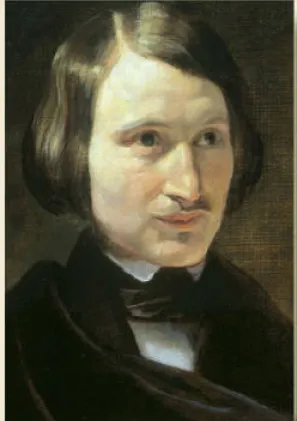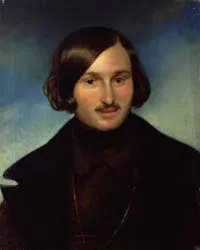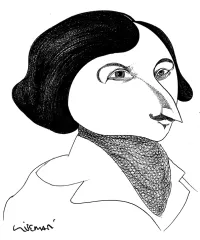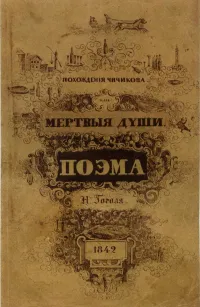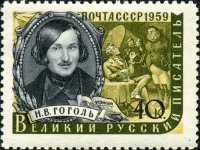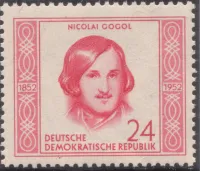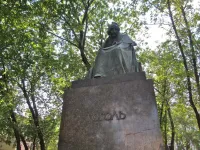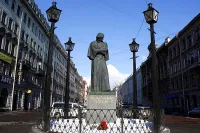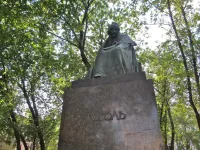Biography
1809 - 1852
“You can't imagine how stupid the whole world has grown nowadays.”
– Nikolai Gogol
Born in the Ukraine, in 1828 Nikolai Gogol moved to St. Petersburg with the intention of becoming a full time writer. His first important literary contribution were the two volumes collection of folk and ghost tales set in the Ukraine entitled Evenings on a Farm near Dikanka (1831-32) which made him one of the nation’s most promising young writers.Three years later he wrote two collections of stories Arabesques and Mirigod which were also well received. The following year he wrote the farcical play "The Inspector General" which lampooned government bureaucracy and although enjoyed by Tsar Nicholas I as well as the public, it generated enough controversy to prompt Gogol to flee the country. It was during his five years living in Rome that he wrote the masterpiece Dead Souls (1842). His collected stories were released the same year were met with great acclaim. Around this time Gogol returned to Russia and became increasingly under the sway of conservative Orthodox Christianity and was intent on establishing a spiritual message in his work. He wrote Selected Passages from a Correspondence with My Friends (1847), a dogmatic Q & A catechism lesson which was not well received. In 1852, after confessing his homosexuality to a fanatical priest, he was told to renounce literature, which prompted Gogol to burn the nearly completed manuscript of the Dead Souls sequel. The priest also said that to cure his “abomination” and cleanse his “inner filth” Gogol should abstain from food and sleep. Several days later he died of starvation at age 43.
1809 - 1852
“You can't imagine how stupid the whole world has grown nowadays.”
– Nikolai Gogol
Born in the Ukraine, in 1828 Nikolai Gogol moved to St. Petersburg with the intention of becoming a full time writer. His first important literary contribution were the two volumes collection of folk and ghost tales set in the Ukraine entitled Evenings on a Farm near Dikanka (1831-32) which made him one of the nation’s most promising young writers.Three years later he wrote two collections of stories Arabesques and Mirigod which were also well received. The following year he wrote the farcical play "The Inspector General" which lampooned government bureaucracy and although enjoyed by Tsar Nicholas I as well as the public, it generated enough controversy to prompt Gogol to flee the country. It was during his five years living in Rome that he wrote the masterpiece Dead Souls (1842). His collected stories were released the same year were met with great acclaim. Around this time Gogol returned to Russia and became increasingly under the sway of conservative Orthodox Christianity and was intent on establishing a spiritual message in his work. He wrote Selected Passages from a Correspondence with My Friends (1847), a dogmatic Q & A catechism lesson which was not well received. In 1852, after confessing his homosexuality to a fanatical priest, he was told to renounce literature, which prompted Gogol to burn the nearly completed manuscript of the Dead Souls sequel. The priest also said that to cure his “abomination” and cleanse his “inner filth” Gogol should abstain from food and sleep. Several days later he died of starvation at age 43.
Demography
Demography
Gender Male
Sexual Orientation Gay
Gender Identity Cisgender
Ethnicity Caucasian/White
Faith Construct Russian Orthodox
Nations Affiliated Russia Ukraine Italy
Era/Epoch Russia Empire (1721-1917)
Field(s) of Contribution
Author
Theater
Commemorations & Honors
Commemorative Stamps in Russia, Soviet Union and Other Countries
Streets in Moscow, Sofia, Odessa, Riga, Belgrade and Other Cities and Towns Named After Gogol
Commemorative Coin Issued by the National Bank of Ukraine (2009)
Demography
Gender Male
Sexual Orientation Gay
Gender Identity Cisgender
Ethnicity Caucasian/White
Faith Construct Russian Orthodox
Nations Affiliated Russia Ukraine Italy
Era/Epoch Russia Empire (1721-1917)
Field(s) of Contribution
Author
Theater
Commemorations & Honors
Commemorative Stamps in Russia, Soviet Union and Other Countries
Streets in Moscow, Sofia, Odessa, Riga, Belgrade and Other Cities and Towns Named After Gogol
Commemorative Coin Issued by the National Bank of Ukraine (2009)
Resources
Resources
Karlinsky, Simon. The Sexual Labyrinth of Nikolai Gogol. Boston: Harvard University Press, 1992.
Resources
Karlinsky, Simon. The Sexual Labyrinth of Nikolai Gogol. Boston: Harvard University Press, 1992.
